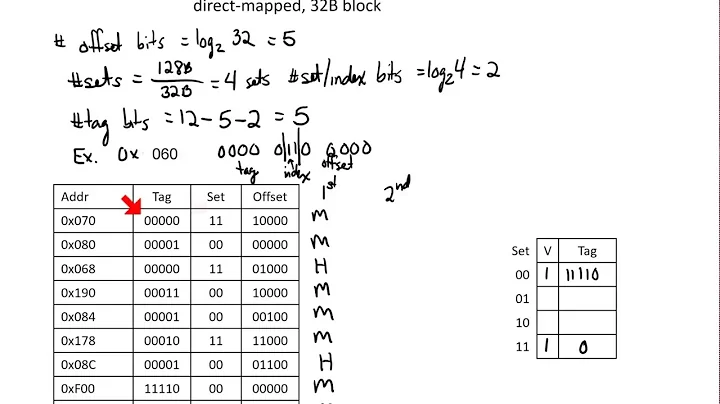Programmatically get the cache line size?
Solution 1
You can use std::hardware_destructive_interference_size since C++17.
Its defined as:
Minimum offset between two objects to avoid false sharing. Guaranteed to be at least alignof(std::max_align_t)
Solution 2
On Linux (with a reasonably recent kernel), you can get this information out of /sys:
/sys/devices/system/cpu/cpu0/cache/
This directory has a subdirectory for each level of cache. Each of those directories contains the following files:
coherency_line_size
level
number_of_sets
physical_line_partition
shared_cpu_list
shared_cpu_map
size
type
ways_of_associativity
This gives you more information about the cache then you'd ever hope to know, including the cacheline size (coherency_line_size) as well as what CPUs share this cache. This is very useful if you are doing multithreaded programming with shared data (you'll get better results if the threads sharing data are also sharing a cache).
Solution 3
On Linux look at sysconf(3).
sysconf (_SC_LEVEL1_DCACHE_LINESIZE)
You can also get it from the command line using getconf:
$ getconf LEVEL1_DCACHE_LINESIZE
64
Solution 4
I have been working on some cache line stuff and needed to write a cross-platform function. I committed it to a github repo at https://github.com/NickStrupat/CacheLineSize, or you can just use the source below. Feel free to do whatever you want with it.
#ifndef GET_CACHE_LINE_SIZE_H_INCLUDED
#define GET_CACHE_LINE_SIZE_H_INCLUDED
// Author: Nick Strupat
// Date: October 29, 2010
// Returns the cache line size (in bytes) of the processor, or 0 on failure
#include <stddef.h>
size_t cache_line_size();
#if defined(__APPLE__)
#include <sys/sysctl.h>
size_t cache_line_size() {
size_t line_size = 0;
size_t sizeof_line_size = sizeof(line_size);
sysctlbyname("hw.cachelinesize", &line_size, &sizeof_line_size, 0, 0);
return line_size;
}
#elif defined(_WIN32)
#include <stdlib.h>
#include <windows.h>
size_t cache_line_size() {
size_t line_size = 0;
DWORD buffer_size = 0;
DWORD i = 0;
SYSTEM_LOGICAL_PROCESSOR_INFORMATION * buffer = 0;
GetLogicalProcessorInformation(0, &buffer_size);
buffer = (SYSTEM_LOGICAL_PROCESSOR_INFORMATION *)malloc(buffer_size);
GetLogicalProcessorInformation(&buffer[0], &buffer_size);
for (i = 0; i != buffer_size / sizeof(SYSTEM_LOGICAL_PROCESSOR_INFORMATION); ++i) {
if (buffer[i].Relationship == RelationCache && buffer[i].Cache.Level == 1) {
line_size = buffer[i].Cache.LineSize;
break;
}
}
free(buffer);
return line_size;
}
#elif defined(linux)
#include <stdio.h>
size_t cache_line_size() {
FILE * p = 0;
p = fopen("/sys/devices/system/cpu/cpu0/cache/index0/coherency_line_size", "r");
unsigned int i = 0;
if (p) {
fscanf(p, "%d", &i);
fclose(p);
}
return i;
}
#else
#error Unrecognized platform
#endif
#endif
Solution 5
On x86, you can use the CPUID instruction with function 2 to determine various properties of the cache and the TLB. Parsing the output of function 2 is somewhat complicated, so I'll refer you to section 3.1.3 of the Intel Processor Identification and the CPUID Instruction (PDF).
To get this data from C/C++ code, you'll need to use inline assembly, compiler intrinsics, or call an external assembly function to perform the CPUID instruction.
Related videos on Youtube
oz10
[Tools I use] UnitTest++ Boost LibBeecrypt SQLite3 CppSQLite stxxl( learning ) [Build Tools] meson cmake scons make nmake mpc (learning) [Compilers] clang aocc MSVC 2012 MSVC 2010 MSVC 2008 MSVC .NET 2005 MSVC .NET 2003 MSVC 6.0 GCC 4.8+ GCC 4.x GCC 3.3
Updated on January 23, 2022Comments
-
oz10 over 2 years
All platforms welcome, please specify the platform for your answer.
A similar question: How to programmatically get the CPU cache page size in C++?
-
 GManNickG over 7 yearsFWIW, C++17 will provide a compile-time approximation of this: stackoverflow.com/questions/39680206/…
GManNickG over 7 yearsFWIW, C++17 will provide a compile-time approximation of this: stackoverflow.com/questions/39680206/… -
 haxpor over 5 yearsaside for C/C++, if you won't mind using assembly to get such info, you can take a look (expanding info from negamartin's answer) at SDL2's source code of
haxpor over 5 yearsaside for C/C++, if you won't mind using assembly to get such info, you can take a look (expanding info from negamartin's answer) at SDL2's source code ofSDL_GetCPUCacheLineSizefunction, then take a look atcpuid macrowhich has assembly source code for each of processor model. You can take a look at imgur.com/a/KP57m6s, or directly peek at the source yourself.
-
-
oz10 about 15 yearsanyone know about how to do this with other processors with built in cache?
-
oz10 about 15 yearswhich of the files contains the cache line size? I'm assuming the coherency_line_size? or the physical_line_partition?
-
Billy ONeal about 14 years@ceretullis: Errr... the x86 has built in cache. What "other processors" are you specifically looking for? What you're asking for is platform dependent.
-
Jakub M. almost 13 yearsTo be sure: this is in Bytes, yes?
-
 John Zwinck over 12 yearsYes, coherency_line_size is in bytes.
John Zwinck over 12 yearsYes, coherency_line_size is in bytes. -
hookenz over 12 yearsMight be better to use sysconf(_SC_LEVEL1_DCACHE_LINESIZE) for linux.
-
FrankH. over 12 yearssimple answers are just the best !
-
 Alexei Sholik almost 11 yearsCould you post sample values of
Alexei Sholik almost 11 yearsCould you post sample values ofcoherency_line_sizeas seen on your machines? For those who don't have Linux at hand. -
Abid Rahman K almost 11 years@android : I use fedora-18 x64 machine with core-i5 processor.
cat /sys/devices/system/cpu/cpu0/cache/index0/coherency_line_sizereturns64in my system. Same for index1,2,3 folders also. -
Maarten Bamelis almost 9 years@warunapww It is in bytes.
-
 Elinx over 7 yearsfinally! hope more guys see this answer for time saving.
Elinx over 7 yearsfinally! hope more guys see this answer for time saving. -
 Nicholas Humphrey over 7 yearsOh my this is really helpful. I'm going to write some game in SDL2 so this is going to be really useful
Nicholas Humphrey over 7 yearsOh my this is really helpful. I'm going to write some game in SDL2 so this is going to be really useful -
Myria about 7 yearsThis technique doesn't work on "Windows Subsystem for Linux", but
sysconf(_SC_LEVEL1_DCACHE_LINESIZE)works on WSL. -
user35915 about 6 years@Matt why? Just curious :-).
-
Frank Liu over 5 years@AbidRahmanK so there is four levels of cache? L0, L1, L2, L3?







